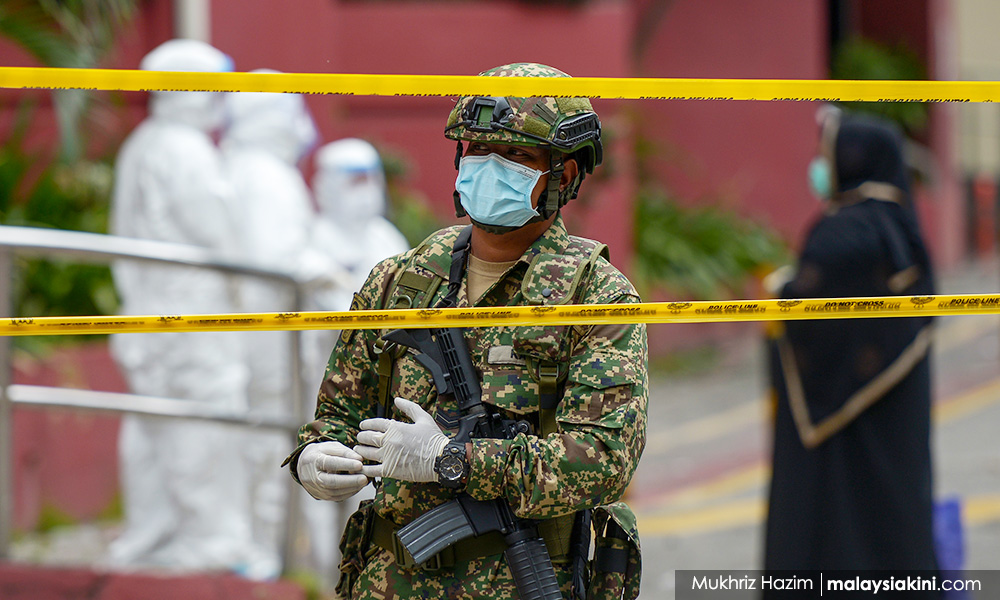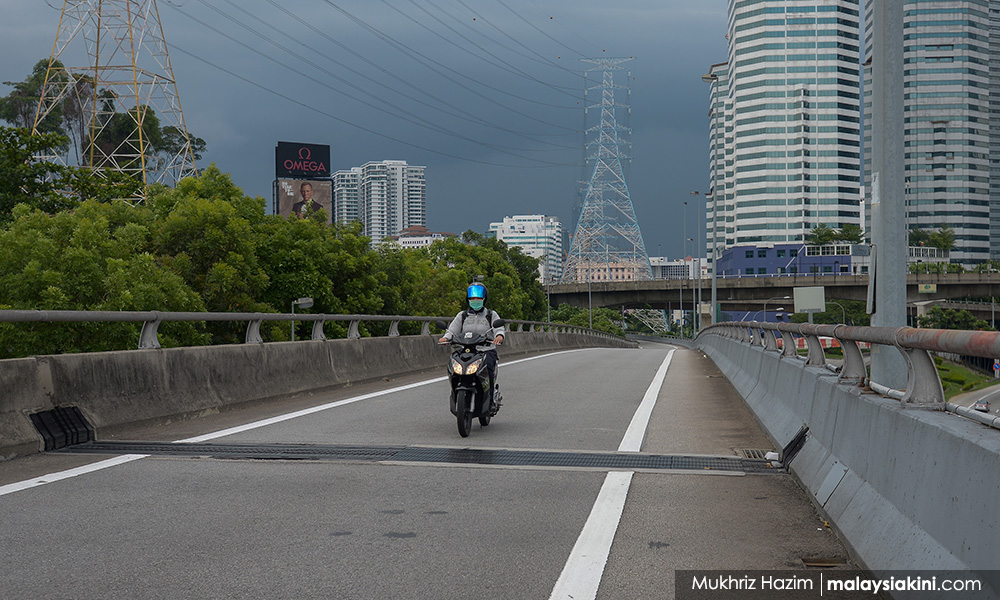LETTER | War involves the mobilisation of the entire country with the single objective of defeating an existential threat. The latter implies the sort of threat that can grind a country to a halt, creating a chain reaction of human miseries.
But the analogy to war should be used not only carefully but critically. First of all, war is a spectrum.
An actual war ranges from low-intensity conflicts or guerilla wars to conventional and nuclear wars.
In this context, Malaysia should be selective in the use - which could lead to abuse - of the concept of war. Words matter in a parliamentary democracy or a constitutional monarchy as the free use of the concept of war either empowers the Prime Minister's Office to do whatever it wants or just as badly, to induce a panic on how he and his team respond to the Covid-19 crisis.
There is no metric to understand the state of mind of decision-makers in Malaysia right. Are they in a strategic war mode or are they reeling from utter fear?
The extension of the movement control order (MCO) from the end of March 31 to April 14 is not a scientific indicator since this is a sledgehammer approach.

Almost any government that wants to exert more and more authority on a public policy issue can do it to relieve the daily pressures they feel as the number of Covid-19 cases begins to tick up or dip down without concurrently allowing more and more patients to recover.
A strategic war mode is when they know how to procure the necessary equipment to test, treat and trace the vectors of transmission - with the attendant ability to stabilise the economy, again and again, to stimulate it later.
That being said, there is no need to use the word war too loosely yet. Covid-19 is a pandemic, which can become endemic too. In other words, it is here to stay.
If the word "war" is deployed too early by members of Parliament or any political parties, without understanding war in their myriad forms, then pressing on with the usage of war would be risky.
First, it allows nationalisation of the private sector, including various industries that are deemed helpful in the fight against Covid-19.
Spain, for example, has nationalised all its hospitals. While this is a good move, as the patients affected by Covid-19 have overwhelmed their public health system, the same hasn't happened to Malaysia yet.
It could happen to Malaysia but it hasn't. Do note that JP Morgan expects the cases in Malaysia to peak in the middle of April 2020 by two times the number of the current cases, making it a total of 6,000 cases and above.
Now, granted that war has to be fought by all patriots alike, citizens who know nothing about Covid 19 would be mobilised through sheer peer pressure to do something for Malaysia. This spirit of doing something or derring-do would run-counter to the MCO.
Second, the rapid yet generic use of the word "war", once again without any specific definition of what kind of war, may see the Malaysian government and opposition alike may not necessarily unite for the better good.
One must remember the first casualty of war is truth. Is the opposition willing to tolerate the suppression of any medical facts or fatalities to keep the national spirit up
Indeed Carl Von Clausewitz, author of the military magnus opus "On War", warned time and again that war is easy to declare but difficult to fight.
An actual war will result in what he called "friction". What is supposed to happen will be bogged down too. Often by mundane factors such as weather, soggy land conditions, mechanical issues, lack of understanding of real and fake information, if not more, to make the whole operation an even more complex affair.
Besides, when the language of war is invoked, no matter how soon, one is not necessarily guaranteed a victory, too, especially when the kind of war one with which one is waging against is an unknown and invisible enemy.
Let alone an enemy with definitive mortality. Thus, public and private hospitals should enhance their coordination. The metaphors of war should not be used as the policy tool to rally Malaysians.

As the fervour, for now, should be to ask, indeed demand Malaysians, to comply totally with the MCO. This is to stop more human traffic from perpetuating various vectors of transmission.
Third, let's assume war is equated with "wartime" production of various medical equipment. In other words, confined to enhanced and increased production of those necessary materials to help the front line medical workers only.
This phrase would have the unintended consequences of prioritising the fight against Covid-19 in the hospital wards, ICU units and quarantine centres. That doctors and nurses would be the frontliners only not the whole society.
Such a scenario would lead to more pressures on doctors and nurses. As they alone would be expected to shoulder the responsibility of fighting Covid-19.
If anything, the private and public health workers would be thrown into disarray. As overtime, they would feel psychologically burdened to the extreme. That only they, and they alone, are expected to carry the physical and proverbial fight of the entire country. Yet, Covid-19 requires all citizens to do the basics - wash their hands and keep to their social distances of at least two metres.
Besides, if the analogy of war has to be invoked anyway, then one should already begin the process to train the soldiers and their medical professionals to handle the Covid-19 patients.
To be sure, no average citizen, when war is invoked, can be transformed overnight from a manual office worker into a clinically qualified worker, let alone a mortician as the fear of death and pestilence would be too overwhelming to bear.
Furthermore, there are strategic implications that go beyond Malaysia when the country uses the analogy of war in a callous manner. For example, war necessitates alliances when you are unable to win.
Since China appears to be winning the "war" against Covid-19, does Malaysia swing to China while the West is wobbling? And, if the answer is no, then why use the word war freely to tie the hands of our policymakers as well as the prime minister?
RAIS HUSSIN is is the president/CEO at Emir Research, an independent think tank focused on strategic policy recommendations based on rigorous research.
The views expressed here are those of the author/contributor and do not necessarily represent the views of Malaysiakini.
Keep up with the latest information on the outbreak in the country with Malaysiakini's free Covid-19 tracker.
Malaysiakini is providing free access to the most important updates on the coronavirus pandemic. You can find them here.
Help keep independent media alive - subscribe to Malaysiakini.

